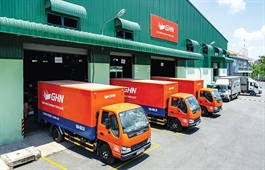GMAC to roll out green project
GMAC to roll out green project
The Garment Manufacturers Association in Cambodia (GMAC) and partners will officially launch the green-tech clean-energy Switch Garment project on Friday.
The project aims to increase competitiveness and employ sustainable energy practices to curb the industry’s environmental impact, GMAC general manager Ly Tek Heng told The Post on Tuesday.
Tek Heng, who heads the project, said GMAC will implement it in collaboration with the Seoul-headquartered treaty-based international organisation Global Green Growth Institute (GGGI) and French NGO Geres-Cambodia.
He said the EU-funded SWITCH-Asia programme has prepared a €2,995,748 budget for the project, which will run from 2020-2024.
At the launch ceremony, officials from State energy utility Electricite du Cambodge (EdC) and the ministries of Environment; and Industry, Science, Technology and Innovation will exchange experiences related to sustainable energy practices in the garment industry, he said.
“We recognise the significance of the project as it will help our association members understand how to use new technology, use new equipment that consumes less electricity, lower costs and attain more benefits, while considering the environmental impact as well,” Tek Heng said.
In particular, he said, the project aims to increase investment in sustainable energy practices, such as technological efficiency, transition to renewable energy and sound operational management in the Kingdom’s factories.
“We will be training our members based on concepts of energy consumption in the garment industry, as some factories do not employ experts in the field and thus their energy use is not yet in line with industrial technical requirements,” he said.
Victor Jona, director-general of the Ministry of Mines and Energy’s General Department of Energy, said the ministry supports and encourages garment factory owners to use energy efficiently and maintain their competitiveness.
“The government’s control mechanism maintains electricity prices and production costs low, assuring that [the industrial sector] retains its competitive edge,” he said.
SWITCH-Asia noted that GGGI’s economic modelling projects that a 20 per cent increase in energy efficiency in the garment sector would lead to a 31 per cent surge in energy productivity by 2030 and $2 billion saved in energy costs.
It said: “Cambodia’s garment industry is losing its edge compared to other countries like Bangladesh, Myanmar and Vietnam, given its high energy costs as well as recent increase in the monthly minimum wage, lagging infrastructure, productivity and logistics.
“The cost of electricity from the national grid in Cambodia is the highest in ASEAN. The average energy cost per tonne of garments is $560.
“Energy costs constitute a significant share of the total production costs, contributing 16.7 per cent, which is also higher than neighbouring countries.”
















